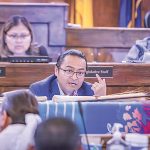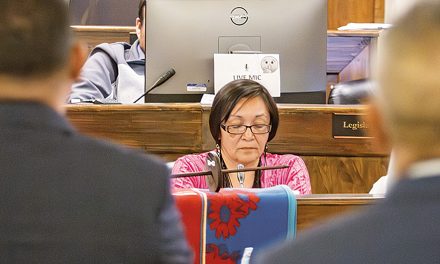
Experts brainstorm on starting a law school
TSAILE, Ariz.
Diné College of Law can have dual meanings depending how you say it.
“If you say it slow – Diné College of Law – it’s a college of law for everybody,” said Diné College President Monty Roessel. “But if you say it fast, Diné-College-of-Law, it’s our school here.”
No matter how you say it, a law school on Navajo is an institution that Diné College is seriously looking into. And last week the college held a Navajo law symposium at the college’s main campus in Tsaile to figure out just how feasible it is.
The two-day symposium brought together legal minds from various law schools across the country. Also in attendance were Navajo Nation Chief Justice JoAnn Jayne, former Chief Justice Robert Yazzie, former Navajo district court judges, as well as peacemakers from the Navajo Peacemaker Court.
Roessel explained that when they thought of whom to invite to this symposium one important aspect was considered: they had to be people who had the experience of working at law schools.
Those who attended were Stacy Leeds, the current dean of the University of Arkansas School of Law and a former Supreme Court Justice for the Cherokee Nation; Patrick Anderson, an Alaska-based lawyer and the CEO of the Rural Alaska Community Action Program, Inc.; Lindsay Robertson, faculty director at the Center for the Study of American Indian Law and Policy at the University of Oklahoma; Robert Coulter, the executive director of the Indian Law Resource Center in Helena, Montana; and former Navajo Nation President Peterson Zah, who also directed DNA-People’s Legal Service for 10 years.
“We don’t know what we don’t know,” said Roessel. “I think everyone is in agreement in terms with what the curriculum will be, and that it will be centered on a Navajo frame of reference, a philosophy that is embedded throughout law.”
Different questions were discussed, including should the college create an actual law college, or just a master’s program? Should a cohort model be in place? What about accreditation? And how to address the Navajo Nation’s shortage of judicial advocates?
“I think I would encourage you to think about — because I think you can pull it off — would be think outside of the accredited law school world,” said Robertson. “But not identify yourself as the unaccredited law school either.
“You’re an Indigenous law school, which is globally significant,” he said. “You could be the model for indigenous instrumental legal education.”
More questions are inevitable after taking the first necessary steps toward establishing a law school on Navajo, said Coulter.
An idea he said is worth looking into is starting a publication where students can share their writing, comments, and articles to create a forum that will help with the realization of what type of institution the law school has evolved into.
Last summer, Diné College established the Navajo Sovereignty Institute. Its director, former Navajo Nation Vice President Rex Lee Jim, organized the symposium and he will also organize a law school advisory committee going forward.
“With him we started thinking on how we can actually develop this symposium to get to the next steps,” said Roessel.
Zah said the concept of a long-range law school program will take time, planning and resources. He also said the demand and need within the current legal system, such as the need for Navajo district judges, should be taken up.
“There is 10 unfilled positions, 50,000 cases per year – that’s a huge blow,” said Zah. “How do we help? What can we suggest in terms of what kind of program to help them with that situation? So we don’t deny any group or person of a hearing process within the Navajo Nation system.”
In 1968, when Dine College was being created, when it was known as Navajo Community College, the idea of creating a law school was already being discussed.
“They did talk about creating a law school. They did talk about creating a medical school,” said Roessel, whose father, Robert Roessel, was instrumental in founding the college. “Their vision was not ‘Let’s just create a community college and that’s it.’”








 Highway 264,
Highway 264, I-40, WB @ Winslow
I-40, WB @ Winslow